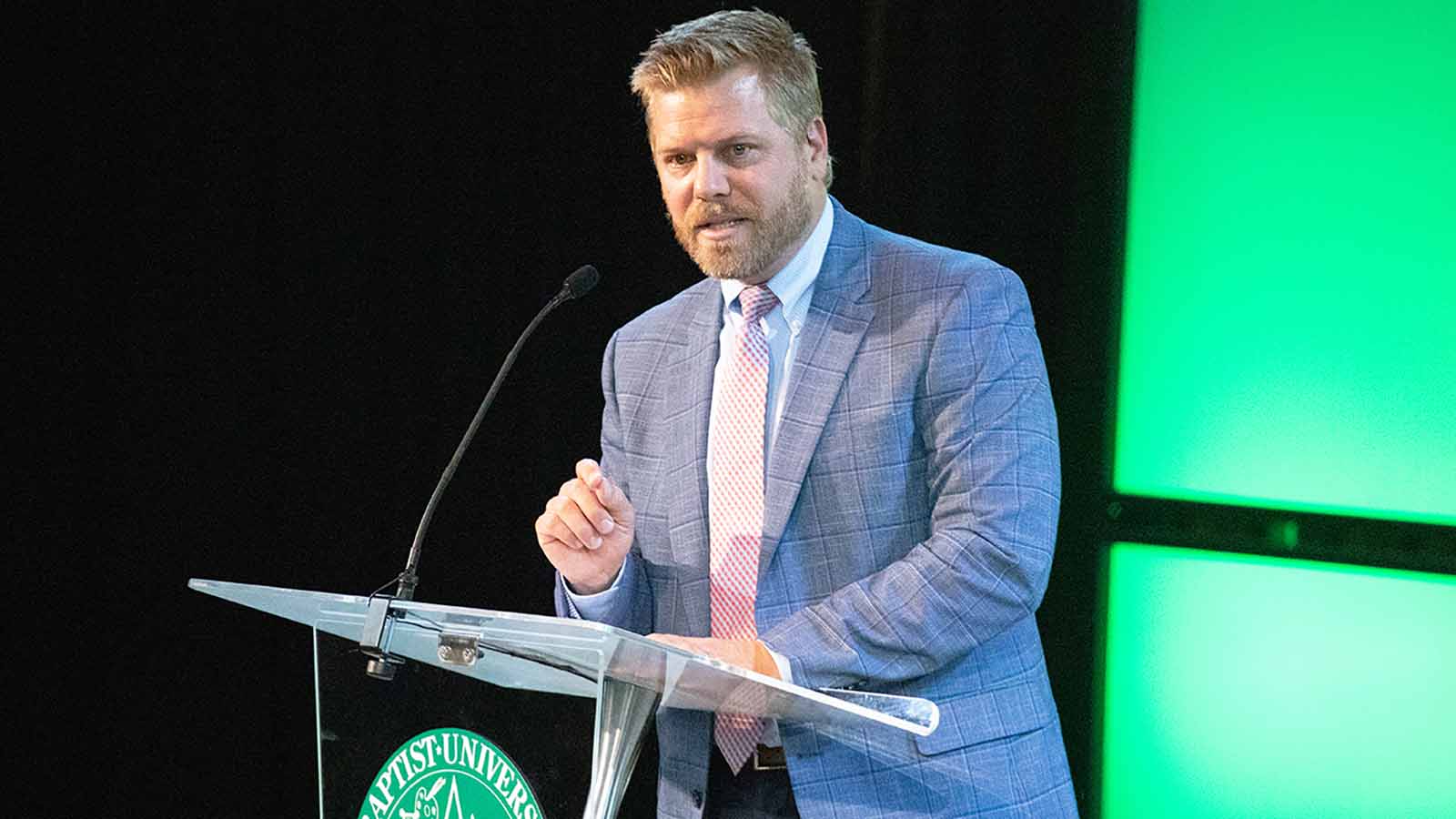Presley Speaks on “Early Christianity” for Hobbs Lecture Sept. 29
September 29, 2021
Dr. Stephen Presley, associate professor of church history and director of research doctoral studies at The Southern Baptist Theological Seminary, delivered the Hobbs Lecture Sept. 29 in Raley Chapel’s Potter Auditorium. The theme of his lecture was “Early Christianity.”
The Herschel H. and Frances J. Hobbs Lectureship in Baptist Faith and Heritage was OBU's first endowed lectureship with its founding in fall 1980. Friends of the late Dr. Hobbs, who was pastor of First Baptist Church of Oklahoma City, and of the late Mrs. Hobbs created the endowed fund in honor of the couple’s history of incredible Christian service.
The Hobbs Lectureship program annually sponsors a lecture at OBU and highlights speakers that share phases of Baptist faith and heritage with the OBU community. It is one of four OBU lectureships designed to help students grow in their knowledge of Baptist theology, Baptist history and studies of the Bible.
Presley spoke on the history of the goodness of the church, with a specific look both at the perspective of early pagans and the perspective of the believers of the early church. According to Presley, modern paganism is imposing its will on Western culture, similar to other points in history. Likewise, in the ancient world, there was a widespread cultural posture of skepticism and hostility toward the Christian church as well as episodic persecution.
Even in the midst of pagan perspectives, however, Presley explained that Christians of the early church understood that defense of the faith began with understanding and maintaining of their Christian identity.
“Cultural engagement with the pagan world does not begin with political maneuvering or social media campaigns,” Presley said. “It begins with a worshipping community that is praying, catechizing, discipling and striving little by little to be conformed to the likeness of Jesus Christ.”
For example, Irenaeus of Lyons supported this Christian vision when he wrote, “For what use is it to know the truth in words only to defile the body with evil deeds? Or what profit is it to seek the holiness of the body and to reject the church’s teaching?”
Likewise, Presley quoted Justin Martyr’s “First Apology,” where he defended the Christian doctrine of helping those who are vulnerable. Presley quoted, “And the wealthy among us help the needy…And they who are well to do, and willing, give what each thinks fit; and what is collected is deposited with the president, who succors the orphans and widows and those who, through sickness or any other cause, are in want, and those who are in bonds and the strangers sojourning among us, and in a word takes care of all who are in need.”
Presley explained that the church holds a unique position in the world. While there is no doubt the culture is changing, Presley claims, “There is much wisdom that can be found in the ancient church,” and that “Christianity is a public good.”
Thus, according to Presley, we as Christians have the same responsibility that the Early Church had to defend Christian doctrines and to interact with culture but not be a part of it. Presley maintained that we have a calling and, “It is not right for us to decline it.”
Presley earned a Bachelor of Science from Baylor University. He then earned a Master of Theology in historical theology from Dallas Theological Seminary and a Ph.D. from the University of St. Andrews in Scotland. He is a native Texan who joined the faculty of Southern Seminary in 2020. He specializes in patristics with an interest in the intersection between the history, theology and exegesis of the early church.
He is the author of “The Intertextual Reception of Genesis 1-3 in Irenaeus of Lyons” (Brill), as well as many articles and essays examining the doctrine, practice and biblical interpretation in early Christianity. He is currently finishing a monograph on cultural engagement in the early church (Eerdmans) that should be out next year as well as a short volume on reading scripture with Irenaeus for Lexham’s Lived Theology Series.
He is a member of the North American Patristics Society, Evangelical Theological Society, Society of Biblical Literature and Institute for Biblical Research. He is a research fellow at the Ethics and Religious Liberty Commission and has served as a pastor, interim pastor and elder at several different Baptist churches.
